
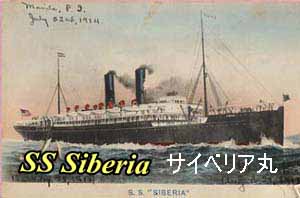 carried "blue-eyed dolls" from the United States, and also Prince Takamatsu on his way to study abroad. On August 2, when it called at Yokohama, Akira met his father again for the last meal, loathing to part with him. Parting was such sweet sorrow.
carried "blue-eyed dolls" from the United States, and also Prince Takamatsu on his way to study abroad. On August 2, when it called at Yokohama, Akira met his father again for the last meal, loathing to part with him. Parting was such sweet sorrow.He had thought himself to be a good sailor in the family cruise in Japanese waters, but soon lost confidence in the wild Pacific Ocean. He just laid himself down on the deck chairs, pale and wretched, unable to take lunch. However, being sociable, he made friends with foreign passengers in no time. Mr. G taught him chess one day. The next day Akira got four wins in five games with him. At night they enjoyed vaudeville to stave off boredom. Japanese passengers showed off
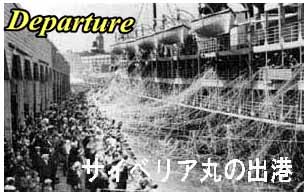 Shakuhachi (bamboo flute), Kabuki, folk music, etc. Thus, while they were spending time in a friendly atmosphere, they arrived in Honolulu in 10 days. After one day for sightseeing in Honolulu, uneventful time passed, he wrote, the repetition of eating, playing, and sleep until they reached San Francisco on August 16.
Shakuhachi (bamboo flute), Kabuki, folk music, etc. Thus, while they were spending time in a friendly atmosphere, they arrived in Honolulu in 10 days. After one day for sightseeing in Honolulu, uneventful time passed, he wrote, the repetition of eating, playing, and sleep until they reached San Francisco on August 16.Though it was in mid-summer, he felt chilly when the ship got into San Francisco Bay in the dense fog under Golden Gate Bridge. Eventually when the fog cleared away, Japan's navy fleet, "Asama" was seen anchored, not knowing Japan and US would come into war in 10 years' time.
Soon, American immigration inspectors came on board for examination before disembarkation. Though some students were required to take extra English exams to pass through, Akira had no difficulty. On landing he met Noguchi, branch manager of Yokohama Bank, who took him around the city in his car the next day. What struck the young Japanese boy who arrived in America from underdeveloped Japan was "numerous cars and high buildings".
The following day Noguchi showed him around Market,
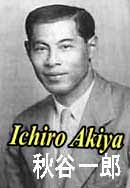 Golden Gate Park, and the museums and Japanese gardens in the morning, but in the afternoon he took a ferry with water wheels on both sides to the opposite shore of the Bay, Auckland to meet Ichiro Akiya. He was a very unique second-generation Japanese American, who openly opposed to Japan's invasion of China, US-Japan war, and even propelled US Congress into compensation for Japanese Americans forced to migrate to concentration camps. Afterwards he got the Martin Luther King human rights award.
Golden Gate Park, and the museums and Japanese gardens in the morning, but in the afternoon he took a ferry with water wheels on both sides to the opposite shore of the Bay, Auckland to meet Ichiro Akiya. He was a very unique second-generation Japanese American, who openly opposed to Japan's invasion of China, US-Japan war, and even propelled US Congress into compensation for Japanese Americans forced to migrate to concentration camps. Afterwards he got the Martin Luther King human rights award. He then took a train to Los Angeles. Akiya had introduced his friend, Takeda, who was to show him around. But Akira mostly moved around according to his own plan that had been well-prepared. It was an era when people became interested in talkie movies instead of silent cinemas. So, he went
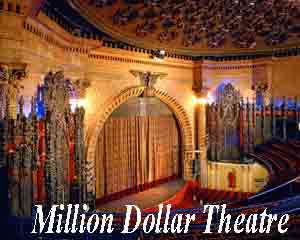 to see a talkie to Million Dollar Theatre, which was said to cost $1 million to build it. To his disappointment, however, he was able to make out less than half of what he had heard. Takeda took him to Lion Farm in the suburbs of LA. It was demolished during the war as it was regarded dangerous, but at that time 150 lions were kept, and he wrote the ferocious roars were far beyond what one could imagine.
to see a talkie to Million Dollar Theatre, which was said to cost $1 million to build it. To his disappointment, however, he was able to make out less than half of what he had heard. Takeda took him to Lion Farm in the suburbs of LA. It was demolished during the war as it was regarded dangerous, but at that time 150 lions were kept, and he wrote the ferocious roars were far beyond what one could imagine.One other spot of interest for him was Mt. Wilson (1742m) 40km away from LA, where he had the chance of looking into the universe through the telescope with the then world's largest diameter of 1.5m(60 inches). Of course the observatory tours and the lectures on astronomy interested him, but the view
 from the summit early next morning left a strong impression upon him. The view of summits sticking out of the sea of clouds in all directions reminded him of that of Seto Inland Sea dotted with small islands.
from the summit early next morning left a strong impression upon him. The view of summits sticking out of the sea of clouds in all directions reminded him of that of Seto Inland Sea dotted with small islands.That night when he returned to San Francisco on a night train, he found crowds of people gathered in the streets enthusiastically hailing the German airship Zeppelin flying over the city from Japan.
He took a train bound for Chicago, where he was to transfer to Bloomington, Indiana. So, he started eastward from San Francisco, but got off at Salt Lake City on the way. The Great Salt Lake is 9 times larger than Lake Biwa near Kyoto, but it is relatively shallow, so a narrow causeway was built connecting east and west shores. Akira, mistaking it for a long
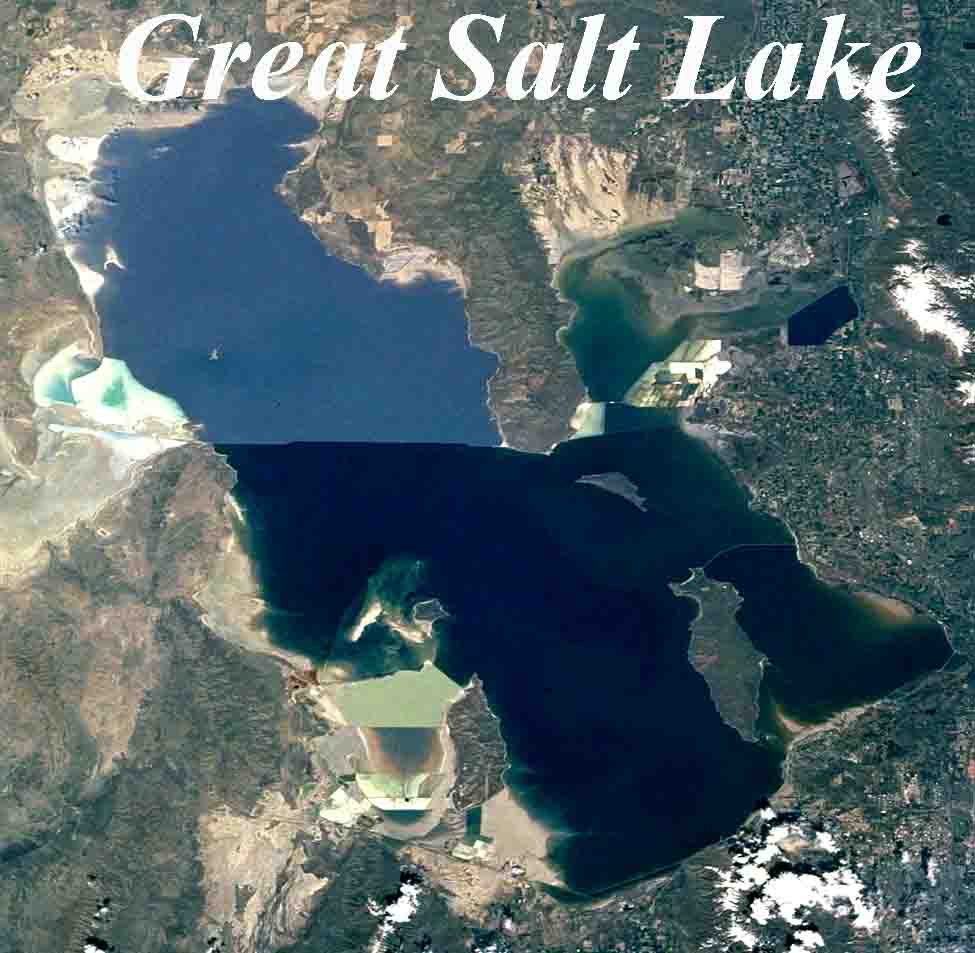 bridge, wrote, "It took 45 minutes for the train to cross the 35km(22miles)-long bridge." The reason he stopped at Salt Lake City was that he really liked to listen to the world's No.1 pipe organ in the cathedral. A friend of his said afterwards that Akira got hold of what he should whenever he made a trip. Here he met two Japanese. One was Giichi Suga, founder of Tokyo YMCA, the other was Toranosuke Aritomi, Japan's first missionary member.
bridge, wrote, "It took 45 minutes for the train to cross the 35km(22miles)-long bridge." The reason he stopped at Salt Lake City was that he really liked to listen to the world's No.1 pipe organ in the cathedral. A friend of his said afterwards that Akira got hold of what he should whenever he made a trip. Here he met two Japanese. One was Giichi Suga, founder of Tokyo YMCA, the other was Toranosuke Aritomi, Japan's first missionary member. The train ran all day in the endless corn fields. The price of meals in the dining car surprised him. One plate of meat with bread, tea and fruit cost him $1.50 (=3 yen). At that time railway fare from Tokyo to Osaka (500km, 312miles) was 6 yen in a 3rd class coach. He tried to
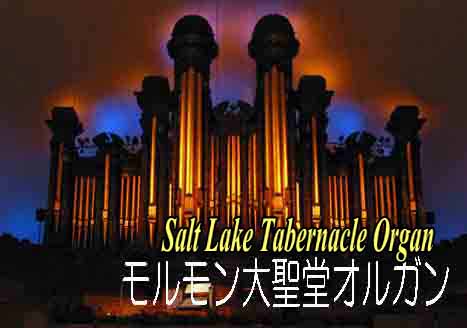 speak to as many people as possible in the train. It was not very difficult to talk to, but sometimes it was really hard to understand spoken English although half a month had already passed since he left Japan. He burst out into laughter when a child in the train asked him, "Are you a White Negro?" Most of the American kids (even adults) in those days must never have met Japanese, and perhaps it was only natural for them to think of no other races than whites or blacks on earth.
speak to as many people as possible in the train. It was not very difficult to talk to, but sometimes it was really hard to understand spoken English although half a month had already passed since he left Japan. He burst out into laughter when a child in the train asked him, "Are you a White Negro?" Most of the American kids (even adults) in those days must never have met Japanese, and perhaps it was only natural for them to think of no other races than whites or blacks on earth. Finally he arrived in Chicago. As he had studied in advance, he visited the Montgomery & Co., which had already started the mail-order system, a large department store Marshall Field, and the world's largest slaughterhouse, Union Stock Yards, where 75,000 cows, 300,000 pigs, 28,000 sheep, 7,000 horses were turned into meat between 9:00am and 3:00pm, he wrote. This time he used trains to visit each place. He had to be thrifty.
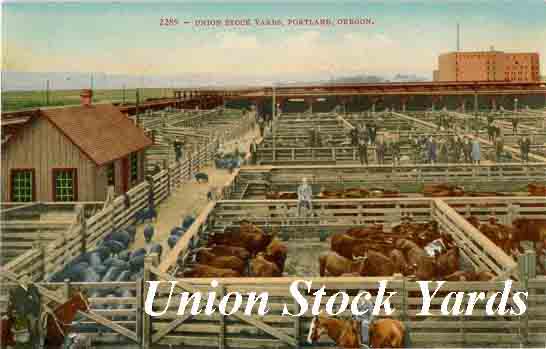
In Chicago he also visited Japanese Consulate to finish the necessary procedures, and took the train to go 300 km south to Bloomington, city of Indiana University. Six and half hours later he safely arrived in it, and settled in Hudelson's as Mr. Smith, lecturer of Kobe University, had kindly introduced to him in Japan. Looking back, he started from Kobe on July 31, and made a 16,000 km(10 thousand miles) journey in 32 days. He got to bed relieved for now.

Sept. 2. Overslept, tired with a long journey. Closed everywhere as it was Labor Day. He went to preview the university. Walking from place to place all day in a motorized America made him feel his legs leaden. Also thirst for orange juice and watermelon...how refreshing! Strolling around halls of the university made his aspiration swell, and he felt like taking classes as soon as possible.
Coming back home, he found a letter left for him saying, "Urgent business has made me leave you alone tonight." Thankful for being trusted, he felt quite lonely, and concentrated on playing the piano in the large house. 
Sept. 16. The first day for the university. After the due procedure of entrance, he was to take a psychology test, but the result was rather a disappointment. Ashamed of this failure he was determined to do what he could to make up for it. Then, the days of concentration upon studies followed with an occasional physical exercise, but...
"Cosmopolitan Meeting" was periodically held in the evening at the student hall as students from a variety of countries like France, Russia, Italy, India, the Philippines, Korea (at that time it was not divided ) and the USA got together. On Nov. 2, he made a speech in English for about 30 minutes about Japan. Next day he was surprised and embarrassed to find a school newspaper headline, "Ohoka Speaks on Japan." He again made up his mind to improve his poor English.
The reason he chose Indiana University was because it was located in a relatively small town in the US, where he thought there would be no other Japanese students attending. Professor Smith of Kobe university who he had consulted as to the choice advised him to come to Bloomington since studying abroad, he said, means to assimilate into the environment independent of other Japanese. However, everything was covered with snow towards the end of October in Bloomington. As there were no such convenient gadgets as TV or Internet, the only means to touch the news of Japan was a bundle of newspapers sent from his father once in a long time. Frequently required assignments and reports were a burden, and English language was also a handicap to him, so he couldn't be fat no matter how much he ate. He weighed only 110 lb(49kg) with his overcoat on, so his real weight would probably be around 100 lb, (45kg), he wrote. He was so small that he had difficulty in finding a raincoat of his size.
That's when a telegram flew in, saying, "Return home, Father seriously ill." Shocked with the news he didn't know what to do. Anyway, he thought ha had to make sure, and to prepare to return home. However, while attending classes absent-mindedly with a dazed head, another telegram came with good news: Father's pneumonia had been suspected of bleeding from intestine, but it turned out to be simply hemorrhoids. So, there was no need of his coming back. He thanked God.
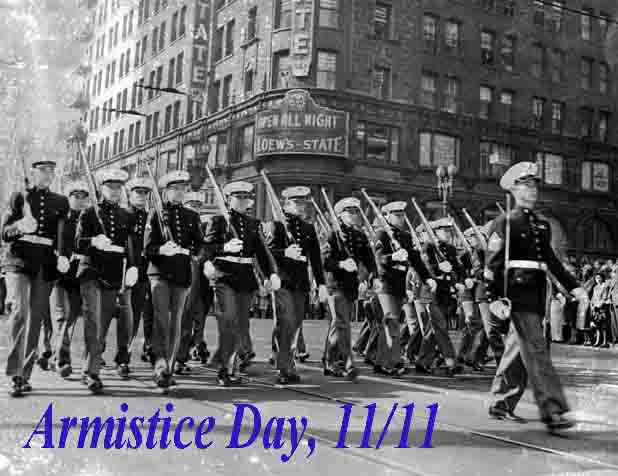 As it was in the era of conscription in Japan, Akira saw the event of Armistice Day with great interest. All the students in armed uniform got together in the gym, gathered at a square, and marched along to the music by the military band, reviewed by military officers. He wrote, "Guns they carry are smaller than those of Japan, and look lighter. The marching event in Japan seem to be more orderly regulated. When they are ordered to hold guns down, they seem to do bullshit." Also, seeing three beauties in crimson red led each regiment, he was surprised at the difference between two countries.
As it was in the era of conscription in Japan, Akira saw the event of Armistice Day with great interest. All the students in armed uniform got together in the gym, gathered at a square, and marched along to the music by the military band, reviewed by military officers. He wrote, "Guns they carry are smaller than those of Japan, and look lighter. The marching event in Japan seem to be more orderly regulated. When they are ordered to hold guns down, they seem to do bullshit." Also, seeing three beauties in crimson red led each regiment, he was surprised at the difference between two countries.
The landlord of the boarding house moved to New York to live with his daughter there. So, he decided to take a lodging where a man named Frank Yelch was to look after him. In the meantime Mr. T, stationed in Dallas branch of Japan Cotton Co., came to visit him. Also, CEO of the company, Mr. Matazo Kita kindly sent him a letter encouraging him. On the other hand, when he took photos of the landlady of the boarding house, he made goofs that would impair her good mood. She said, "I look like an elephant!" However, she was nice to him. She came to his graduation ceremony in place of his parents, and celebrated the day making cherry pies after picking up fruit in the back yard. Mrs  Frank Yelch wrote, "I loved to hear him play the piano. Akira had a beautiful soft touch, and I soon learned to know the Japanese National Air, I called it. He always played it first. When he graduated (got his degree) I went out to the campus and saw Him March up with hundreds of students and receive his diploma. I was very proud of him, and he seemed to be my boy."
Frank Yelch wrote, "I loved to hear him play the piano. Akira had a beautiful soft touch, and I soon learned to know the Japanese National Air, I called it. He always played it first. When he graduated (got his degree) I went out to the campus and saw Him March up with hundreds of students and receive his diploma. I was very proud of him, and he seemed to be my boy."
Anyway he managed to take a bachelor's degree in a year. It was because of great care and affection of people around him as well as his strenuous efforts. Especially Professor Kennedy was a great mentor who he always depended upon for advice. He even invited Akira to his home on Lake Erie in Willowick, Ohio, and let him stay with his family for the whole summer. The professor seem to have seen Akira working too hard, and to have felt the need of providing him with some haven to make him relaxed and refreshed.
Next Page
